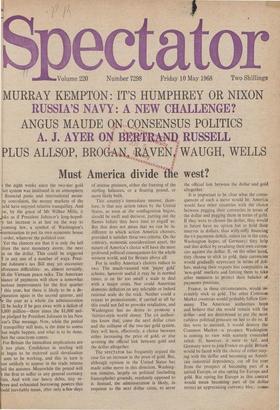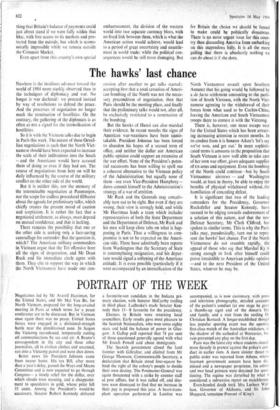Must America divide Tie west?
the eight weeks since the two-tier gold ice system was instituted in an atmosphere financial panic and international mono- ry convulsion, the- money markets of the rid have enjoyed relative tranquillity. And w, by the grace of Mr Wilbur Mills, it ks as if President Johnson's long-hoped- Yet the chances are that it is only the lull fore the next monetary storm, the next n on the dollar. This could be triggered in any one of a number of ways. Presi- nt Johnson's tax Bill may yet encounter foreseen difficulties : so, almost certainly, ll.the Vietnam peace talks. The American lance of payments will show a somewhat urious improvement for the first quarter this year, but there is likely to be a de- rioration again in the second quarter, and ✓ the year as a whole the administration ill be lucky if he gets away with a deficit of ,000 million—three times .the $1,000 mil- n pledged by President Johnson in his New ear's Day message. Now, while the period tranquillity still lasts, is the: time to assess hat might happen, and what is to be done, hen the cataclysm comes. , For Britain the immediate implications are I too plain. Confidence in sterling will t begin to be restored until devaluation seen to be working, and this in turn is ost unlikely to appear in the trade returns til the autumn. Meanwhile the pound will b the first to suffer in any general currency risis. And with our heavy debts, tiny re- of intense pressure, either the freezing of the sterling balances, or a floating pound, or more likely both.
This country's immediate interest, there- fore, is that any action taken by the United States, as soon as the conflagration begins, should be swift and decisive, putting out the flames before they have time to engulf us. But that does not mean that we can be in- different to which action America chooses, provided it satisfies these two criteria. On the contrary, economic considerations apart, the nature of America's choice will have the most profound political consequences for the whole western world, and for Britain above all.
For in reality America's choices reduce to two. The much-vaunted SDR 'paper, gold' scheme. hpwever useful it may be in normal times, is on far too small a scale to deal with a major crisis. Nor could American domestic deflation on any tolerable or indeed rational scale do the trick. Neither could a retreat to protectionism; if carried at all far this could not fail to provoke retaliation, and Washington has no desire to promote a 'thirties-style world slump. The us authori- ties know that, come the next dollar crisis and the collapse of the two-tier gold system, they will have, effectively, a choice between either increasing the price of gold, or else severing the official link between gold and the dollar altogether.
The SPECTATOR has frequently argued the case for an increase in the price of gold. But, although opinion in the United States has made some move in this direction, Washing- ton remains, largely on political (including francophobe) grounds, resolutely opposed to it. Instead, the administration is likely, in response to the next dollar crisis, to sever the official link between the dollar and gold altogether.
It is important to be clear what the conse- quences of such a move would be. America would face other countries with the choice between pegging their currencies in terms of the dollar and pegging them in terms of gold. If they were to choose the dollar, they would in future have no option but to hold their reserves in dollars, thus willy-nilly financing the us payments deficit, unless (as in the case, Washington hopes, of Germany) they help end that deficit by revaluing their own curren- cies against the dollar, If, on the other hand; they choose to stick to gold, their currencies would gradually appreciate in terms of dol- lars, making their exports less competitive in 'non-gold' markets and forcing them to take other measures to protect their balance of payments positions.
France, in these circumstances, would in- evitably stick to gold. The other Common Market countries would probably follow Ger- many. The American authorities hope and believe that she would remain with the dollar—and are determined to put the most ruthless political pressure on her to do so. If this were to succeed, it would destroy the Common Market—a prospect Washington is coming to view with scarcely concealed relish. If, however, it were to fail, and Germany were to join France on gold, Britain would be faced with the choice of either stay- ing with the dollar and becoming an Ameri- can industrial dependency, cut off for ever from the prospect of becoming part of a united Europe, or else opting for Europe and gold. But opting for Europe in this context would mean becoming part of (in dollar terms) an appreciating currency bloc: sonic- thing that Britain's balance of payments could just about stand if we were fully within that kloc, with free access to its markets and pro- tected from the outside, but which is econo- mically impossible while we remain outside the Common Market.
Even apart from this country's own special embarrassment, the division of the western world into two separate currency blocs, with no fixed link between them, which is what the American action would achieve, would lead to a period of great uncertainty and unsettle- ment in world trade; while the political con- sequences would he still more damaging. But for Britain the choice we should be forced to make could be politically disastrous. There is no more urgent issue for this coun- try than dissuading America from embarking on this stupendous folly. it is all the more galling that there is absolutely nothing we can do about it if she does.







































